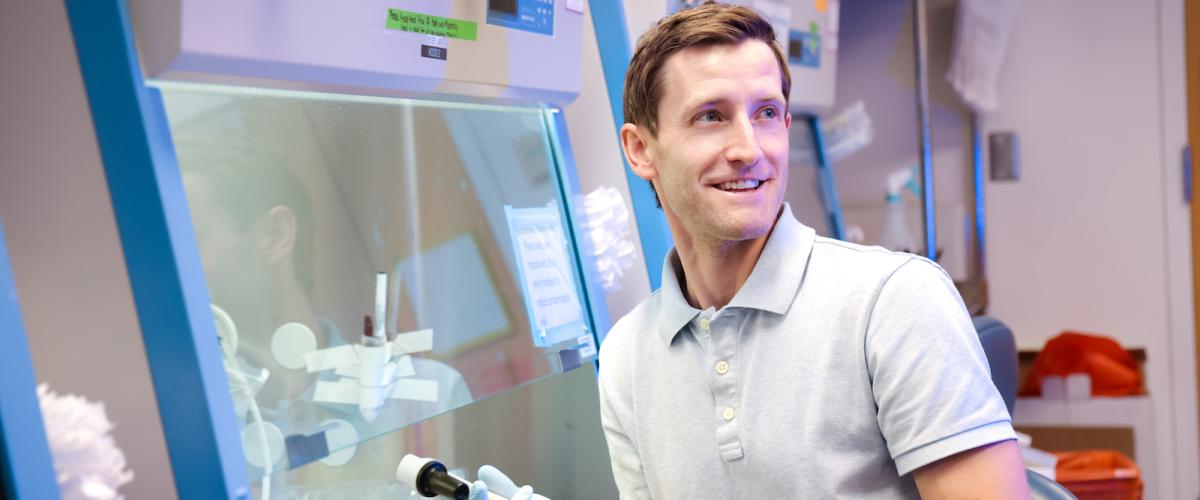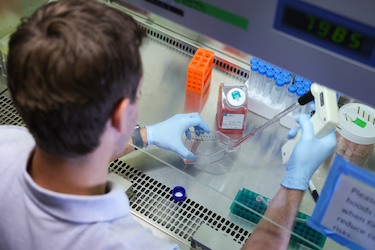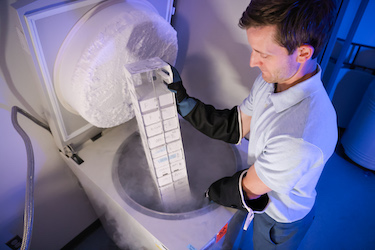
When Pete Hendrickson, MD, PhD, finishes his residency, his graduation will mark not only a personal accomplishment, but an institutional one as well – he will be the first trainee to complete residency through the novel Radiation Oncology Research Scholar (RORS) track at Duke Radiation Oncology.
The Road to Radiation Oncology
Dr. Hendrickson’s interest in genetics-based research began during his time in college. “The human genome sequencing project had recently finished, and genetics was front and center in science,” he recalled. “Everyone knew this was going to transform how we study and practice medicine. I fell in love with it right away.”
That led him to two years in a clinical research lab at Northwestern University and the Children’s Memorial Hospital of Chicago (now Lurie Children’s Hospital). “Although the very basic science research I was doing as an undergrad was exciting in its own way, it wasn’t until I got here that I realized science is so much more than an academic pursuit. At the end of the day, it’s about leveraging lab-based discoveries to help real people. That’s when I realized the MD/PhD pathway was right for me.”

Dr. Hendrickson completed his MD/PhD at the University of Utah, where he became interested in cancer genomics and developmental biology. He completed his PhD thesis in the lab of Bradley Cairns, PhD (an HHMI investigator at the Huntsman Cancer Center), where he made a seminal discovery identifying DUX4 as a master regulator of embryonic cell fate. He decided to match into radiation oncology. “I knew I wanted to see and treat cancer patients and radiation oncology to me was the most intellectually and professionally rewarding of the oncology-based disciplines,” he said. “And scientifically, I think I saw a unique opportunity in radiation oncology to build on my interests and experience in genomics in a way that could meaningfully impact patient outcomes.”
Enter Duke Radiation Oncology. When Dr. Hendrickson started looking into residencies, Duke stood out. “I felt Duke was at the forefront of research in oncology, and more specifically radiation oncology,” he said. He reached out to one of Duke’s PIs early on, and even before applying to residencies, “Duke just seemed like the right fit.” What solidified his decision was the establishment of the RORS track in 2019, and his chance to be the first RORS trainee.
The RORS Track
The RORS track, a first-of-its-kind program nationally, was developed by faculty at Duke to provide a pathway for radiation oncologist physician-scientists to become independent laboratory investigators. The RORS track combines a research-intensive residency with the opportunity to continue mentored research post-residency as an instructor, allowing a total of 45 months of dedicated scholarly effort. The unique aspect of the program is early commitment at the time of the residency match to candidates with strong backgrounds and high potential for success. The long research time horizon and strong institutional support allows RORS scholars the opportunity to think big and try bold, high-impact projects to rapidly generate data and lead to early career development awards.
“Although radiation oncology is one of the key cancer disciplines, it is the only one that does not have a specific track to guide trainees to become independently funded investigators,” said Joseph Salama, MD, residency program director and co-creator of the RORS track. Despite many MD/PhD graduates entering the field of radiation oncology in past years, there are few externally funded physician-scientists, and only a fraction of NIH cancer research funding is awarded to investigators in radiation oncology. In creating the RORS track, Dr. Salama and others hoped to bolster young physician-scientists in the field by providing an adequate training structure and continued mentored research time after residency. “The RORS track is meant to provide the time, structure and funding to make a runway for trainees so that they can lead their own independent research lab after residency.”
This protected time the RORS pathway offers is especially critical to young physician-scientists – time to delve into projects, time to cultivate ideas, time to make meaningful contributions to the field and, maybe most critically, time to apply for K08 awards to facilitate the transition to being an independent physician-scientist.
Reflections on Training

“At the end of the day, the RORS track is the most direct path to success as a physician-scientist in this field,” Dr. Hendrickson said. As the first RORS trainee, he says he has “benefitted most from the close-knit community of faculty at Duke who have mentored me in all aspects of the training path from bench to bedside.” Now, with four other RORS trainees in the residency program, “I think we’re starting to build a pipeline for success that is going to be helpful for younger RORS trainees. Most importantly, I can’t emphasize how important it is to be in an environment where there are others who are doing the same thing and who share a common vision for their career.”
Click to read about Dr. Hendrickson’s current research directions.